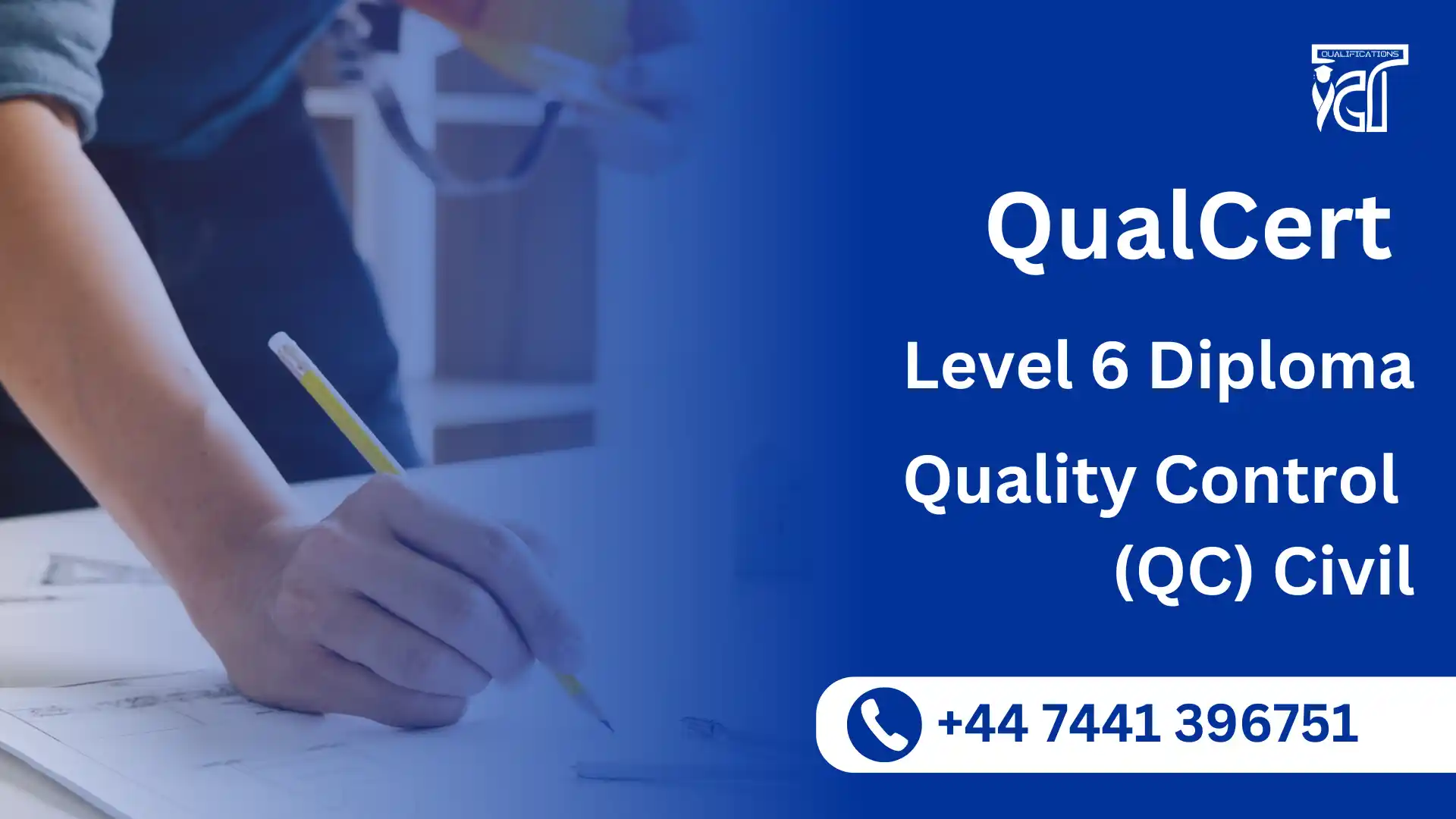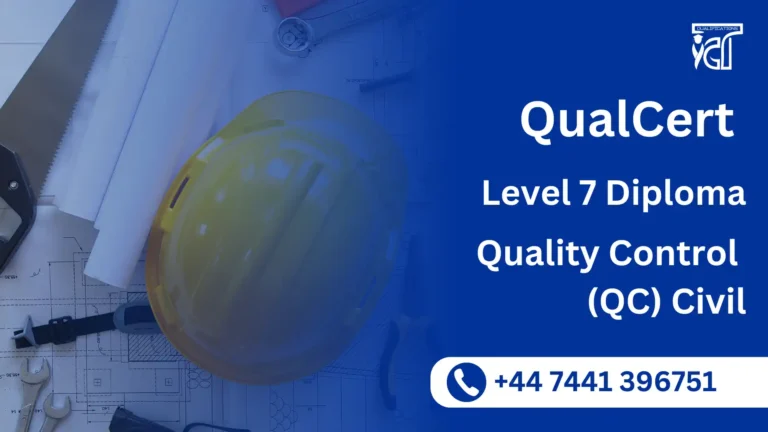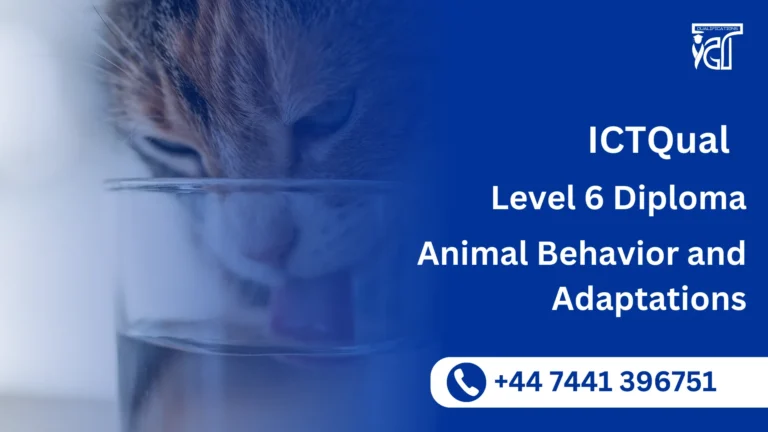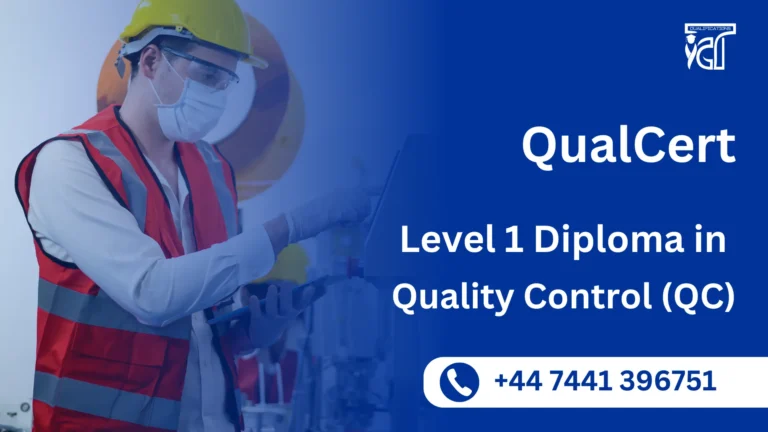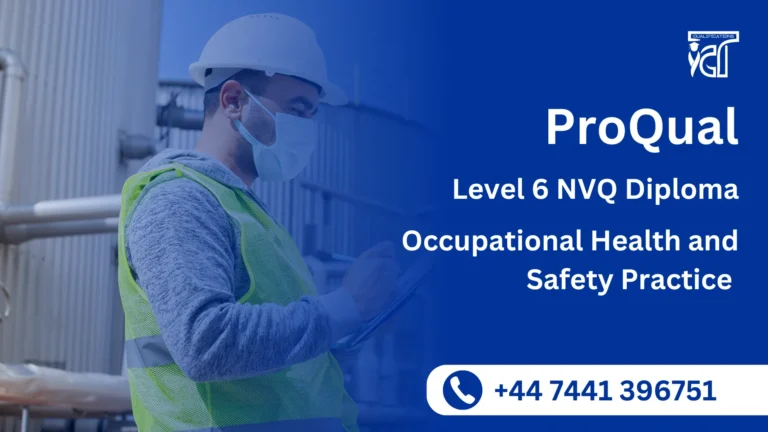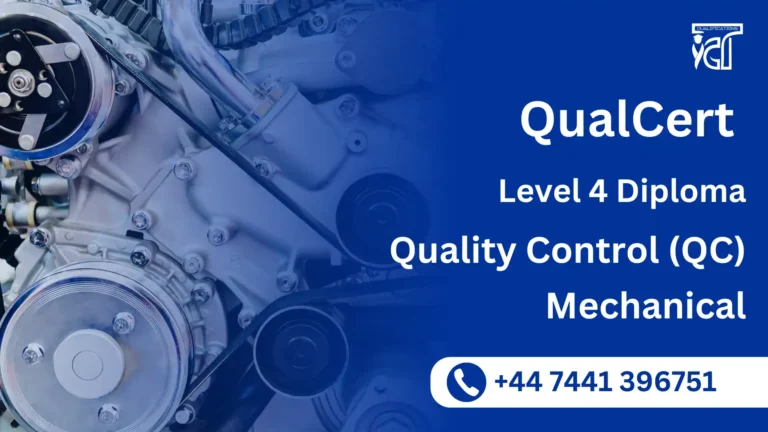The QualCert Level 6 Diploma in Quality Control (QC) – Civil is a highly regarded professional qualification designed to equip learners with advanced knowledge and practical skills in quality control within the civil engineering and construction sectors. This program focuses on the application of quality control systems, site inspection procedures, material testing, compliance with international construction standards, and quality documentation processes.
Tailored for mid-career professionals and aspiring quality specialists, this diploma bridges the gap between technical fieldwork and quality management. It provides a solid platform for individuals responsible for monitoring construction processes, evaluating workmanship, and ensuring that civil engineering projects meet both regulatory and client quality expectations.
Whether you’re a civil engineer, site supervisor, quality technician, or construction manager, this qualification empowers you to take a leadership role in quality control, minimize project risks, and ensure the delivery of safe, compliant, and high-quality infrastructure.
QualCert Level 6 Diploma in Quality Control (QC) Civil
The QualCert Level 6 Diploma in Quality Control (QC) Civil is structured to provide a comprehensive foundation in quality control practices specific to civil engineering. Below is the qualification structure, including the Total Qualification Time (TQT) 1200, Guided Learning Hours (GLH) 600, and 120 Credits associated with the program.
| Unit Ref# | Unit Title | Credit | GLH | TQT |
| QC090012 – 1 | Strategic Quality Management in Infrastructure Projects | 20 | 100 | 200 |
| QC090012– 2 | Policy Development and Regulatory Compliance | 20 | 100 | 200 |
| QC090012– 3 | Advanced Testing Methods and Material Science | 20 | 100 | 200 |
| QC090012– 4 | Sustainable QC Practices and Environmental Impact | 20 | 100 | 200 |
| QC090012– 5 | Quality Control Leadership in Global Projects | 20 | 100 | 200 |
| QC090012– 6 | Research-Based Quality Control Innovations | 20 | 100 | 200 |
GLH (Guided Learning Hours) and TQT (Total Qualification Time) are terms commonly used in vocational qualifications to help define the amount of time a learner is expected to spend on their studies.
1. GLH (Guided Learning Hours)
GLH refers to the number of hours a learner spends being directly taught, supervised, or supported during their course. This includes the time spent in activities such as:
- Classroom instruction
- Practical workshops
- One-on-one tutoring or mentoring sessions
- Online learning sessions with tutor support
In other words, GLH represents the time that learners are actively engaged with their instructors or learning activities.
2. TQT (Total Qualification Time)
TQT represents the total amount of time a learner is expected to invest in completing a qualification, including:
- GLH (Guided Learning Hours): Time spent on direct learning, as explained above.
- Self-Directed Learning: This includes time spent on independent study, research, assignment completion, preparation for exams, and any other work the learner does outside of direct teaching hours.
TQT is a broader measure that includes all the time required to achieve the qualification. It helps learners and employers understand the overall commitment required for the qualification.
Key Differences Between GLH and TQT:
- GLH focuses on direct learning with guidance or supervision.
- TQT includes GLH as well as independent study time and other learning-related activities.
Example:
If a qualification has a TQT of 600 hours and a GLH of 250 hours, it means the learner should spend 250 hours in direct learning (classroom, online, or tutor-led sessions) and 350 hours on independent study or research.
- Strategic Quality Management in Infrastructure Projects
- Develop a comprehensive understanding of quality management strategies in large infrastructure projects.
- Learn to assess and implement quality control plans that align with project objectives and client specifications.
- Gain skills in identifying potential risks and mitigating quality-related challenges in infrastructure development.
- Policy Development and Regulatory Compliance
- Understand the role of policy development in ensuring regulatory compliance within civil engineering projects.
- Acquire knowledge on industry regulations and standards that impact quality control practices.
- Develop the ability to create and enforce policies that ensure legal and regulatory requirements are met throughout a project’s lifecycle.
- Advanced Testing Methods and Material Science
- Master advanced testing techniques to evaluate the quality and integrity of construction materials.
- Learn to assess material properties and their impact on the long-term sustainability and safety of civil engineering projects.
- Develop expertise in selecting the appropriate testing methods to ensure the compliance and durability of materials used in construction.
- Sustainable QC Practices and Environmental Impact
- Explore sustainable quality control practices that minimize environmental impacts in civil engineering projects.
- Gain insights into environmental regulations and how they influence quality management decisions.
- Learn strategies for integrating sustainability into quality control processes to reduce waste, energy consumption, and resource depletion.
- Quality Control Leadership in Global Projects
- Develop leadership skills necessary for managing quality control teams in large-scale, international projects.
- Learn to navigate cross-cultural and regulatory challenges in managing quality control across different countries.
- Gain the ability to adapt quality management practices to diverse global standards and project requirements.
- Research-Based Quality Control Innovations
- Gain a deep understanding of current research trends in quality control within the civil engineering industry.
- Learn how to apply research findings to improve existing quality control practices and innovate new solutions.
- Develop critical thinking skills to assess and implement cutting-edge quality control technologies and methodologies in civil projects.
Specialized Training in Civil Quality Control
Gain in-depth knowledge of quality control practices tailored specifically to civil engineering and construction environments, including roads, bridges, buildings, and infrastructure.
Career Advancement Opportunities
This qualification enhances your potential for promotion to roles such as QC Engineer, Site QA/QC Inspector, Quality Supervisor, or Compliance Coordinator in civil construction projects.
Industry-Relevant Practical Skills
Learn how to apply quality standards on-site, conduct inspections, assess materials, and manage documentation in compliance with national and international codes (ISO, ASTM, ACI, BS EN, etc.).
Improved Project Performance
Equip yourself with the tools to reduce construction defects, rework, and delays by implementing effective quality control systems and best practices.
Globally Recognized Qualification
Earn a diploma that is internationally respected, increasing your credibility and mobility in the global construction and engineering job markets.
Bridges Technical and Quality Roles
Designed to support professionals transitioning from fieldwork to quality management roles, providing both operational insight and quality system knowledge.
Supports Compliance and Risk Management
Understand how to meet statutory, contractual, and safety-related quality requirements, helping organizations maintain a strong reputation and reduce liabilities.
Pathway to Higher Qualifications
Acts as a stepping stone to Level 7 diplomas in QC or QA, ISO Lead Auditor qualifications, or postgraduate study in civil quality or construction management.
Enhances Analytical and Supervisory Skills
Build competencies in identifying non-conformities, root cause analysis, corrective/preventive actions, and supervision of QC teams on construction sites.
Applicable Across Multiple Civil Sectors
Valuable for professionals involved in residential, commercial, transportation, water, or government infrastructure projects.
The ideal candidate for this qualification is someone who:
- Works in the Civil Engineering or Construction Sector
- Civil engineers, site supervisors, inspectors, or technicians currently involved in infrastructure or construction projects.
- Has a Technical Background
- Individuals with a Level 5 diploma, technical certificate, or equivalent qualification in civil engineering, construction technology, or a related field.
- Is Seeking to Specialize in Quality Control
- Professionals who want to transition from general construction roles into specialized QA/QC positions focused on ensuring quality and compliance on civil projects.
- Has On-Site Experience
- Learners with practical experience in construction sites, material inspections, or quality-related documentation and reporting.
- Aspires to Mid-Level or Supervisory Roles
- Those aiming to move into positions such as QA/QC Civil Engineer, Quality Control Supervisor, Site Quality Inspector, or Documentation Controller.
- Values Industry Standards and Best Practices
- Individuals committed to applying internationally recognized quality standards (ISO, ASTM, BS EN, etc.) in their daily work.
- Possesses Analytical and Detail-Oriented Skills
- Learners who can assess compliance, detect non-conformities, and participate in quality improvement processes on engineering sites.
- Wants Career Growth and Global Opportunities
- Candidates looking for career progression and better job prospects in both local and international civil engineering markets.
- Is Committed to Continuous Professional Development
- Professionals aiming to keep pace with evolving construction technologies, materials standards, and quality control practices.
- Prefers Practical, Application-Focused Learning
- Those who benefit from hands-on case studies, real-world scenarios, and technical assignments related to quality assurance in civil engineering.
Entry Requirements
Register Now
Qualification Process
Qualification Process for the QualCert Level 6 Diploma in Quality Control (QC) Civil
- Self-Assessment:
Begin by evaluating your eligibility to ensure you meet the qualification requirements, including work experience, knowledge, and language proficiency. - Registration:
Complete your registration by submitting the required documents, including a scanned copy of a valid ID, and paying the registration fee. - Induction:
An assessor will conduct an induction to confirm your eligibility for the course and explain the evidence requirements. If you do not meet the criteria, your registration will be canceled, and the fee will be refunded. - Assignmnets & Evidence Submission:
Provide all assignmnets and the necessary evidence based on the assessment criteria outlined in the course. If you are unsure of the required evidence, consult with the assessor for guidance on the type and nature of evidence needed. - Feedback and Revision:
The assessor will review your submitted evidence and provide feedback. Evidence that meets the criteria will be marked as “Criteria Met,” while any gaps will be identified. You will be asked to revise and resubmit if needed. - Competence Evidence:
Submit final evidence demonstrating that all learning outcomes have been met. This evidence will be marked as “Criteria Met” by the assessor once it is satisfactory. - Internal Quality Assurance (IQA):
The Internal Quality Assurance Verifier (IQA) will review your evidence to ensure consistency, quality, and compliance with standards. - External Verification:
The IQA will submit your portfolio to QualCert External Quality Assurance Verifiers (EQA) for final confirmation. The EQA may contact you directly to verify the authenticity of your evidence. - Certification:
Upon successful completion of all checks, QualCert will issue your official certificate, confirming that you have attained the QualCert Level 6 Diploma in Quality Control (QC) Civil.

